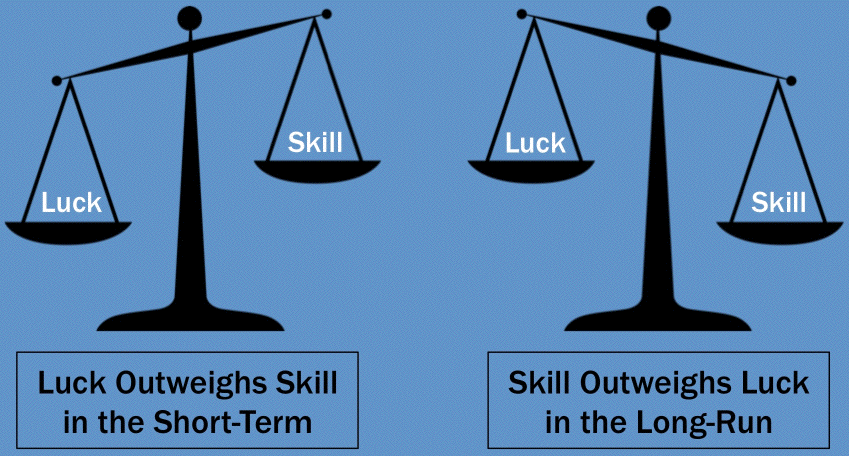
Play for long periods
To make money playing poker, you have to play for the long term and accept the risks of the short term.
But what does it mean to "play for the long term"? First of all, it is important to note that we are not talking about playing a different game. There is a "right" way to play each hand in a way that makes you money, and your goal should be that you play each hand the right way. It is true that when you play poker, you have to be playing for the long term in your mind, because focusing on the short term can lead you to be vulnerable in the game and to do the following psychological mistakes in poker. If you play for a long period of time, you won't care about the results of a single session, especially with one hand. By playing long term, you will be convinced to play in such a way that you will be a winning player in the long term, regardless of your short term results.
A player who focuses on his short-term results will be ecstatic after a good winning session and depressed after a losing one. He will also be forgiving of his mistakes.
Best poker rooms
Playing to a draw
Players who focus on the short term will do everything possible to avoid a losing session. If they get stuck, they tend to play until they even their score. This approach can have disastrous results.
Firstly, they may continue playing when they are tired or bored, which means that they are not playing their the best game. Second, such an approach can lead to "tilt'o" especially if it goes down even further, which makes players doubly upset. Of course, in a tilt, they are likely to lose even more money and become even more determined to get at least some of it back. As you can see, the result is quite dangerous and brutal.
Storing victory
The opposite scenario is also possible. Short-term players are very fond of recording a winning session and overestimating it. A popular saying among ordinary poker players is "Get out while you're ahead", which stems from the depression of being ahead and losing all your winnings.
One of the worst possible options for a short-term player is to lose the money he has already won, even though he loses it playing good poker. He will tend to quit when he is ahead, even though he is in a good game and playing well.
Alternatively, a short-term player could do something worse. He may stay in the game, but start playing very conservatively and reduce the value of his hands to a positive value, so that the game becomes one that gives him as little chance as possible of losing a large sum of money.
Getting angry at bad players
A player who cares about short-term results will be very annoyed when he loses to one of his opponents' poor play. He thinks that the results of his individual session are important and every time he loses a pot he will think that he should have won that pot, especially a big one, and it is painful. This can lead to resentment towards the player who has played badly and even to playing hands that should not be played just because he wants to get back at his opponent. Alternatively, he may attack the bad player, which is always a bad idea, because the bad player may withdraw from the game or at least start playing better. A player who gets angry at losing a pot against poor play by his opponents risks starting to play poorly himself in an attempt to get back the money he has lost.
Change your game recklessly
When playing for a long period of time, you realise that you can lose money in a short period of time through no fault of your own. On the other hand, a player who is concerned about the short term will instinctively try to change the game if the results are not going well. Don't misunderstand, it is a good idea to constantly review your game and change it accordingly, but it is a very bad idea to change your game based on short-term results. Remember that this is a common mistake among mid-level players. When they have a run of poor results, they will continually make poor adjustments to their game to improve their performance without realising (or accepting) that their losses are mainly due to short-term success.
All in all, playing for the long term is the only way to play successful poker. Players fixated on short-term results tend to suffer unwarranted mental anguish, which results in making bad decisions when playing poker.
Source: The Poker Mindset: Essential Attitudes for Poker Success





